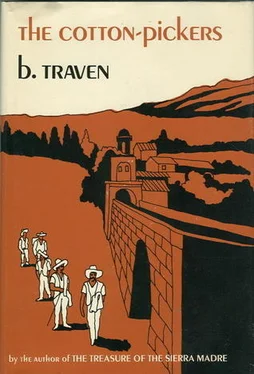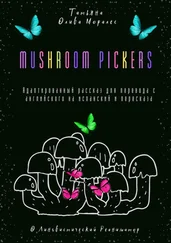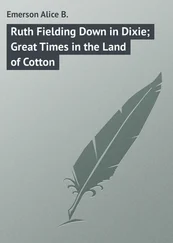B. Traven - The Cotton-Pickers
Здесь есть возможность читать онлайн «B. Traven - The Cotton-Pickers» весь текст электронной книги совершенно бесплатно (целиком полную версию без сокращений). В некоторых случаях можно слушать аудио, скачать через торрент в формате fb2 и присутствует краткое содержание. Год выпуска: 1969, Издательство: Hill and Wang, Жанр: Проза, на английском языке. Описание произведения, (предисловие) а так же отзывы посетителей доступны на портале библиотеки ЛибКат.
- Название:The Cotton-Pickers
- Автор:
- Издательство:Hill and Wang
- Жанр:
- Год:1969
- ISBN:нет данных
- Рейтинг книги:3 / 5. Голосов: 1
-
Избранное:Добавить в избранное
- Отзывы:
-
Ваша оценка:
- 60
- 1
- 2
- 3
- 4
- 5
The Cotton-Pickers: краткое содержание, описание и аннотация
Предлагаем к чтению аннотацию, описание, краткое содержание или предисловие (зависит от того, что написал сам автор книги «The Cotton-Pickers»). Если вы не нашли необходимую информацию о книге — напишите в комментариях, мы постараемся отыскать её.
—Book World
The Cotton-Pickers — читать онлайн бесплатно полную книгу (весь текст) целиком
Ниже представлен текст книги, разбитый по страницам. Система сохранения места последней прочитанной страницы, позволяет с удобством читать онлайн бесплатно книгу «The Cotton-Pickers», без необходимости каждый раз заново искать на чём Вы остановились. Поставьте закладку, и сможете в любой момент перейти на страницу, на которой закончили чтение.
Интервал:
Закладка:
What I had saved at this river crossing, I owed to my dear little calves. The love we had shown to them and their mothers had been bountifully repaid.
24
The cattle drive would not have seemed the real thing without bandits or rustlers. In fact, as each day passes, you feel rather surprised if they don’t show up. A big cattle transport like ours can’t take place in a vacuum. Dozens of men see it, it gets talked about, and you never know what pair of eyes is a scout for a band of cattle thieves or bandits.
One morning we met them. They came riding along quite innocently and might have been taken for ranch hands riding to market or looking for work. They approached from our flank.
“Hello!” called the leader. “Any tequila?”
“No,” said I, “no tequila. But we’ve got some tobacco. You can have some.”
“All right. We’ll take it. Got any maize leaves?”
“We can spare two dozen.”
“We’ll take them too. Well, now, what about money? The transport must have money for ferries and toll bridges.”
Things were getting hot — money. “We’ve no money with us, only checks.”
“Checks, rubbish. Can’t read.”
They talked among themselves, and then the spokesman came riding alongside. “About the money, we’ll look into that.”
He searched my pockets, the saddlebags, saddle, and gear — no money. He found only the checks, and had to admit that I spoke the truth.
“We could do with some cows,” he decided.
“I could do with some myself,” I said. “I’m not the owner. I’m only in charge of transporting these cattle.”
“Then you won’t be hurt if I take out one or two for myself.”
“Go ahead,” I agreed, “help yourself. I’ve one good cow, but with a lame foot. She’ll be in milk in three months. You can cure the hoof; it’s not bad.”
“Where is she?”
I had her driven out, and he liked her. All this time, the transport had been moving on, for it couldn’t be halted by a word of command, like an army, particularly since there was no grazing. The rustlers obligingly rode along beside me.
The leader said: “Well, you’ve given me one, and now it’s my turn to pick one out for myself.”
He picked one, but he didn’t know much about cattle, and I didn’t mind losing the one he picked.
“Now you can pick one out for me,” he granted.
I did so. Then he picked himself another one. This time he took one of the milk cows.
“Now it’s your turn again, señor!” he called.
I had to have my little joke. I called the man who was carrying the milk cow’s calf on his saddle. “Here you are, the little one in the bargain,” I said, handing the little calf over to him. He was well satisfied with the bargain, and let the calf pass for a fully grown animal. But he wasn’t acting out of generosity. Oh, no. Many people can’t milk cows; or they can milk the cow only if the calf is sucking. The milk must practically flow by itself, as if she’s giving the milk to her calf. So, the calf was a welcome gift to that man. He could now get milk from the cow for his family, or for sale.
It was his turn to pick out another cow.
When they rode away, they had seven cows and one calf — which cost me a hundred and seventy-five pesos. Of course, the possibility of bandits was duly considered when I made the contract with Mr. Pratt; it was only a question of how I’d deal with the bandits. It’s best to bargain with them, as with businessmen, and employ diplomacy, too, for they might well have driven off with fifteen, instead of seven and a half.
It all counts up as business expense, like freight demurrage. It was a business risk, such as a derailed train, a ship wrecked or burned would be. In this country, at that time, no rancher insured his herd; no insurance company would issue a policy except at impossible rates. Bandits were a business risk, just as depot, freight, feeding, watering, taxing, and licensing might be in other regions. Here, the risks are rivers, mountains, mountain passes, gorges, sandy regions, waterless routes, bandits, jaguars, rattlesnakes, copperheads, and, if worst comes to worst, a cattle epidemic which might be caught from contact with other cattle met on the march.
Here, the cost was borne by the vastness of everything: the land, the herds, the breeding, the increase. Mr. Pratt’s twelve thousand head were not among the largest herds of the region. Bandits and rustlers were just another factor. Of course, one can shoot at bandits, or threaten to call the military. Some fools may do that. You can always see it done, very nicely, in films: three dozen bandits fleeing from one smart cowboy. In the movies, yes; in reality, no. In reality, it’s quite, but quite, quite different.
In reality, bandits do not gallop off so easily. It is the birthright of bandits to take what they need. Three hundred years of slavery and subjugation under Spanish overlords and Church domination and torturers couldn’t but demoralize this most upright people on earth. My bandits were pleased that they got everything so easily, so pleasantly, with such genial conversation, including my little calf joke. So we all were pleased.
Now we had to make a long detour, for a biggish town lay on our route, and no grazing ground near it. We had to make our way up a river cut, and then cross a range of mountains, la Sierra.
Here, it was getting cool. There was plenty of water about, but grazing was getting tight and the animals were eating leaves from the trees. Tree foliage was as filling as grass, and seemed to make a pleasant change for the cattle. As I watched them stripping the leaves off trees so neatly I couldn’t but believe that cattle in ancient times may not have been prairie and steppe beasts, but beasts of the forest, living off shrubs and low-branched trees, in woods that have nearly disappeared while tall high-growing trees have survived.
The mountain crossing was laborious, for these range cattle were not used to mountain trails. Two lost their footholds, one of them a magnificent young bull. He went down with his cow just as they were merrily copulating — a tragedy of love. We could see them lying in the gorge below, smashed. For all that, I’d anticipated more falls.
We had two cases of snakebite, too. One morning we noticed that two of the cows had swollen legs; examination showed the fang marks. But the cows had been lucky, evidently not fatally infected with the venom. We treated the wounds by cutting them open, bathing them in pure alcohol, and applying tourniquets above the wound. We had a two-day halt, once that crossing was behind us, and the cows picked up well. I was glad to be able to save them.
That evening two Indians started a terrible argument as to what kind of snakes those had been. One maintained for rattlesnakes; the other insisted on copperheads. I settled the dispute, which threatened to become serious, by drawing a parallel: “Castillo, if you were shot at, or worse, shot dead, it wouldn’t matter to you whether you were shot with a revolver or a rifle, would it?”
“Seguro, señor, this doesn’t matter. Shot is shot.”
“There you are, muchachos. The same goes for cows. They’ve been bitten by poisonous snakes, by rattlers or coppers. It hurts. As for the rest, they don’t give a damn.”
“You’re right, señor, a poisonous snake. Who cares what kind?”
They found my dictum so clever that they turned from snakes to curability of snakebites, discussing all kinds of herbs and Indian remedies, and so their quarrel petered out.
25
One day at sunrise when we were calling the signal to start off, I rode up a hill to see beyond the herd and decide on our direction. From the hilltop, I could see church spires in the distance.
Читать дальшеИнтервал:
Закладка:
Похожие книги на «The Cotton-Pickers»
Представляем Вашему вниманию похожие книги на «The Cotton-Pickers» списком для выбора. Мы отобрали схожую по названию и смыслу литературу в надежде предоставить читателям больше вариантов отыскать новые, интересные, ещё непрочитанные произведения.
Обсуждение, отзывы о книге «The Cotton-Pickers» и просто собственные мнения читателей. Оставьте ваши комментарии, напишите, что Вы думаете о произведении, его смысле или главных героях. Укажите что конкретно понравилось, а что нет, и почему Вы так считаете.











